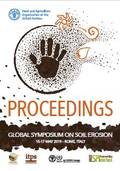Publications
Proceedings of the Global Symposium on Soil Erosion
The proceedings book of the GSER19 contains all papers presented both orally and in poster format during the symposium. The papers have provided sufficient scientific evidence to show that soil erosion is a global threat to food production systems, rural livelihoods, human health and biodiversity, and that coordinated action needs to be fostered and accelerated to address this issue.
Global Symposium on Soil Erosion: Outcome Document
The Outcome Document of the GSER 19 highlights scientific evidence on the status of soil erosion, its impacts and the agenda for action in the framework of achieving the SDGs. The document also provides recommendations for developing sound environmental policies and programmes to encourage the use of sustainable soil erosion control practices.
Soil erosion: the Greatest Challenge for Sustainable Soil Management
Despite almost a century of research and extension efforts, soil erosion continues to be the greatest threat to soil health and soil ecosystem services in many regions of the world. Our understanding of the physical processes of erosion and the controls on those processes has been firmly established. Nevertheless, some elements remain controversial.
Soil loss Atlas of Malawi
With over three-quarters of the country’s soils at risk, soil loss in Malawi represents a major threat to food security and nutrition, agricultural growth, the provision of ecosystem services and the achievement of the SDGs. Since the Malawian economy is highly dependent on agriculture, soil loss is a significant hindrance to the overall economic development of the country.
Code de conduite international sur l’utilisation et la gestion durables des engrais
Le Code de conduite vise à traiter des questions de portée mondiale et contribue ainsi à la réalisation de certains objectifs de développement durable (ODD). Il établit un cadre adaptable au contexte local, assorti d’un ensemble de pratiques d’application volontaire, au service des différents acteurs directement ou indirectement concernés par les engrais.
Soil and nutrients loss in Malawi: an economic assessment
Soil loss is a major threat to agricultural development in Malawi, and the size of the agricultural sector in the Malawian economy renders it a major limitation to the overall economic development of the country. Soil loss reduces cultivable soil depth, but also takes away fertile soils from farmlands. The net effect is a loss of agricultural productivity, increased expenditure on fertilizers, and a general decline in profitability of crop production.
Status of the World's Soil Resources
Main report
The SWSR is a reference document on the status of global soil resources that provides regional assessments of soil change. The information is based on peer-reviewed scientific literature, complemented with expert knowledge and project outputs. It provides a description and a ranking of ten major soil threats that endanger ecosystem functions, goods and services globally and in each region separately.
Directives volontaires pour une gestion durable des sols
Elles ont été adoptées par l’Assemblée plénière du Partenariat mondial sur les sols à sa quatrième session (Rome, 25 mai 2016), approuvées par le Comité de l’agriculture de la FAO à sa 25ème session (Rome, 28 septembre 2016) et enfin, entérinées par le Conseil de la FAO à sa 155ème session (Rome, 5 décembre 2016).
Les Directives volontaires pour une gestion durable des sols ont été élaborées dans le cadre d’un processus ouvert, au sein du Partenariat mondial sur les sols. Elles visent à servir de référence et à fournir à un vaste éventail de parties prenantes engagées des recommandations générales d’ordre technique et stratégique concernant la gestion durable des sols.
Charte mondiale des sols révisée
Des sols sains sont une condition préalable essentielle pour satisfaire divers besoins en nourriture, biomasse (énergie), fibre, fourrage et autres produits; et pour assurer la fourniture de services écosystémiques essentiels dans toutes les régions du monde. Cependant, les ressources en sol de l’humanité sont confrontées à des pressions sans précédent. Il s’agit notamment de diverses formes de dégradation des sols, dont l’imperméabilisation liée à une urbanisation rapide, qui ont de graves conséquences.
Use of 137Cs for soil erosion assessment
Soil erosion is the most destructive land degradation process causing removal of soil, siltation of water reservoirs and pollution of water sources. Combating erosion needs reliable data on soil erosion rates, its dynamics and spatial distribution. Collecting such data with conventional methods requires great investment and long period of time. The 137Cs method for erosion assessment can address this problem.










